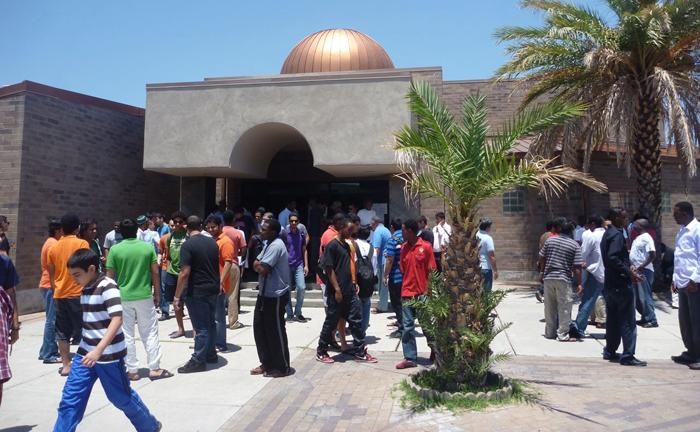Muslims on campus have begun observing Ramadan, the Islamic holy month ordaining they refrain from eating or drinking during daylight.
Fasting began on Aug. 1. The start of fasting changes every year because Ramadan is based on the lunar calendar.
Muslims worldwide recognize Ramadan, which according to Islam is when the first verses of the Quran were revealed to the Prophet Muhammad more than 1,400 years ago. Muslims fast to appreciate what they have and gain sympathy for those who have less.
“”We’re hungry for a month. Millions of people feel that way for the entire year,”” said Jamil Anouti, president of the Islamic Center of Tucson. Back in the 1960s, UA students looking to expand their prayer area out of the Student Union eventually led to the formation and construction of the center at 901 E. First St., in 1990.
Anouti said the center is the vital and only steppingstone for all UA Muslim students and faculty, hailing from at least 20 different countries and numbering in the hundreds. Along with providing them with a religious and social community during the year, the center offers them a place to break their fast and pray during their sacred month.
“”A large portion of the student body are going without food or water for about 15 hours a day for an entire month,”” Anouti said.
He said at least one resident assistant sends his hungry students from the residence halls to the center for iftar, the evening meal Muslims use to break their fast.
The center makes a point of reaching out to non-Muslims as well. In the past, teachers have offered extra credit to students who attend the iftar.
Sa’ad Ansari, an Islamic Center of Tucson consultant, said, on average, six UA and Pima Community College students convert to Islam at the center every month. He also said the number of converts usually increases during Ramadan, and two students have already asked about converting.
Amro Hamed, a pre-business sophomore and last year’s Muslim Student Association treasurer, said he worries Ramadan will lose its campus relevance to non-Muslims as the lunar calendar forces it earlier into the summer.
“”It’s going to be difficult to reach out to people with Ramadan when that happens, but we’ll do our best,”” Hamed said. “”There’s still people doing summer school.””
Hamed said, due to fasting in the Middle East, repeating the practice on campus is not hard for him. “”But it’s still painful to watch people drink water,”” he joked.
Few people on campus feel the anguish of fasting like Mohamud Ige did when he was on the UA’s cross country team.
The May 2011 communications graduate and former track and field captain would exhaust himself both in practice and competition without even a cup of water.
“”Running 10 miles wasn’t that bad,”” he said, but during more intense exercise days, he would break his fast. He said he regrets doing so, and that he would make up by fasting the six or seven days after Ramadan had ended.
Ige said his teammates and coaches were supportive and never pressured him to drop fasting for better performance. He said their fascination with his fasting and being a Division I athlete allowed him to promote a positive image of Islam to many people. He said he hopes his example encourages other Muslim students to push through their hunger pains.
Ige is training in Flagstaff for the 2012 Olympics in London, and said he is confident that his dedication to his religion will not waiver, no matter how high the stakes rise.
“”The gold isn’t worth my religion,”” he said.
Ramadan has made a positive impact on campus in the past and hopefully the same will be true this year, Anouti said.
“”We’re making an effort to improve the UA experience for students through Ramadan,”” Anouti added. “”And hopefully we can do that for a large segment of the population, whether they’re Muslim or not.””









